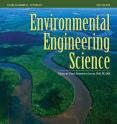Can aromatherapy produce harmful indoor air pollutants?
Spas that offer massage therapy using fragrant essential oils, called aromatherapy, may have elevated levels of potentially harmful indoor air pollutants such as volatile organic compounds (VOCs) and ultrafine particles, according to an article in Environmental Engineering Science, a peer-reviewed journal published by Mary Ann Liebert, Inc. Fragrant essential oils, derived from plants, may release various VOCs into the air. VOC degradation caused by the reaction of these compounds with ozone present in the air can produce small, ultrafine byproducts called secondary organic aerosols (SOAs), which may cause eye and airway irritation.
Taiwanese researchers Der-Jen Hsu (National Kaohsiung First University of Science and Technology), Hsiao-Lin Huang (Chia-Nan University of Pharmacy and Science, Tainan), and Shiann-Cherng Sheu (Chang-Jung Christian University, Tainan) tested both fragrant and Chinese herbal essential oils for SOA formation in a controlled-environment study chamber under different test conditions. They also performed air sampling and analysis in spa centers that offer massage therapy using essential oils.
The authors compared SOA levels associated for the various fragrant and herbal essential oils tested and present their results in the article, "Characteristics of Air Pollutants and Assessment of Potential Exposure in Spa Centers during Aromatherapy." They conclude that the layout and ventilation within a particular spa may affect the level of indoor air pollutants produced during massage with aromatherapy.
"Dr. Der-Jen Hsu and his colleagues have done a very nice job in bringing attention to often overlooked health risks associated with luxuries intended to enhance our sense of well-being," says Domenico Grasso, PhD Editor-in-Chief and Vice President for Research, Dean of the Graduate College, University of Vermont (Burlington).
Source: Mary Ann Liebert, Inc., Publishers
Other sources
- Can aromatherapy produce harmful indoor air pollutants?from Science DailyThu, 20 Oct 2011, 17:31:00 UTC
- Can aromatherapy produce harmful indoor air pollutants?from PhysorgThu, 20 Oct 2011, 15:30:36 UTC
